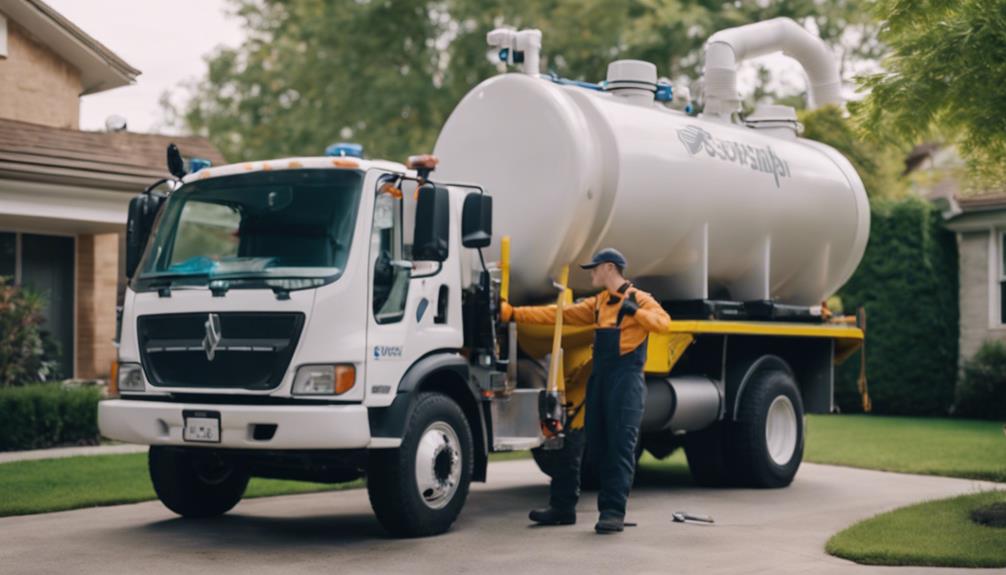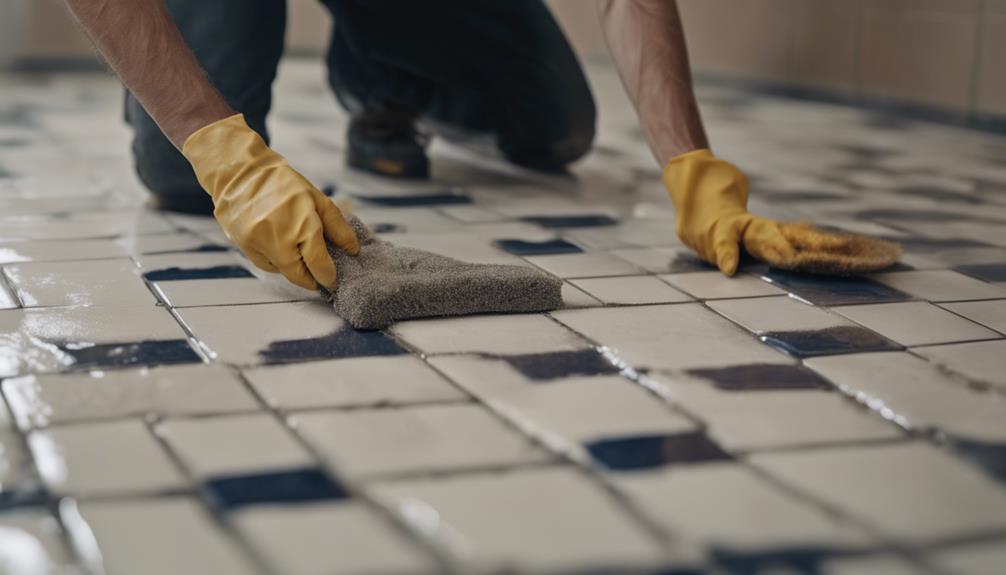To maintain your septic tank, remember these tips! Schedule regular cleanings every 3-5 years to prevent issues. Opting for professional cleaning guarantees effective sludge removal and peak system function. Watch for signs like slow drains or foul odors, which signal the need for maintenance. Practice water conservation to prevent overloading your system. Avoid flushing non-biodegradable items and protect the drain field. By following these tips, you'll keep your septic tank in top shape, preventing costly repairs and ensuring efficient wastewater treatment!
Key Takeaways
- Pump septic tanks every 3-5 years to prevent malfunctions and backups.
- Avoid flushing non-biodegradable items to prevent blockages.
- Practice water conservation to prevent overloading the system.
- Protect drain field by refraining from placing heavy objects on it.
- Conduct routine inspections for early issue detection and prevention.
Importance of Regular Cleaning
Regular septic tank cleaning is vital for homeowners to prevent system failure and maintain proper wastewater treatment. Conserving water and practicing regular cleaning can greatly benefit your septic system. By having your septic tank cleaned on a routine basis, you can prevent costly repairs, guarantee a healthy septic environment, and extend the lifespan of your system.
Proper maintenance not only keeps foul odors at bay but also prevents contamination of soil and groundwater. Additionally, regular cleaning helps in maintaining the efficiency of your septic system, avoiding backups and malfunctions.
If you feel unsure about how often your system needs cleaning or lack the necessary equipment, seeking professional assistance is highly recommended. Trained technicians can provide safe and effective sludge removal, tailored to your specific needs, ensuring your septic system operates smoothly for years to come.
Professional Cleaning Services

Professional cleaning services for septic tanks offer trained technicians with specialized equipment for safe and effective sludge removal. These professionals guarantee thorough and complete cleaning of accumulated waste, preventing potential damage to your septic system. By following proper procedures, they ensure that the cleaning process is done correctly, maintaining the peak functioning of your system.
Regular professional cleaning services are essential to keep your septic system healthy and prevent costly repairs in the future. DIY cleaning attempts can lead to incomplete removal of sludge, which may cause blockages and system malfunctions. By hiring experts, you not only save time and effort but also guarantee that your septic tank receives the care it needs to operate efficiently.
Investing in professional cleaning services is a proactive step towards maintaining a trouble-free septic system. Let the experts handle the cleaning, and enjoy the peace of mind that comes with a well-maintained and healthy septic system.
Cleaning Frequency Recommendations

Maintaining a consistent septic tank cleaning schedule is important for the proper functioning of your household system. Regular pumping helps in preventing backups, foul odors, and costly system malfunctions. The frequency of cleaning your septic tank depends on various factors such as tank size, the number of occupants in your home, and your water-usage habits. As a general rule, septic tanks should be cleaned every 3 to 5 years. However, households with excessive water usage or larger tank sizes may need more frequent cleaning to guarantee the proper functioning of their septic system. Implementing water-saving practices can also help extend the time between cleanings. Regular inspections of your septic tank are vital to catch any issues early and maintain a properly functioning system. Below is a table summarizing septic tank cleaning frequency recommendations:
| Situation | Cleaning Frequency |
|---|---|
| Regular Household | Every 3-5 years |
| Excessive Water Usage | More frequent cleaning |
| Larger Tank Size | More frequent cleaning |
Signs of Need for Cleaning

If you notice slow drains in sinks and showers, it could be an indication of a buildup of sludge in your septic tank. This sludge accumulation can hinder the proper flow and treatment of wastewater, signaling the need for cleaning.
Additionally, foul odors emanating from drains or the vicinity of the septic tank are clear signs that maintenance is required. Pooling water around the tank or drainfield may also suggest that your septic tank is full and needs immediate attention to prevent further issues.
Besides, if you observe unusually lush grass over the drainfield, it could indicate a problem with your septic system, emphasizing the importance of cleaning.
Regular maintenance and cleaning are essential to avoid costly repairs and guarantee the efficient operation of your septic tank. By staying vigilant and addressing these warning signs promptly, you can prevent major issues and maintain the functionality of your septic system.
Essential Maintenance Practices

To maintain the health and efficiency of your septic system, regular septic tank pumping every 3 to 5 years is necessary. This practice prevents sludge buildup, which can lead to system failures.
Additionally, to ensure the proper functioning of your system, it's important to avoid flushing non-biodegradable items to prevent blockages. Implementing water conservation practices is also key to preventing overloading the septic system, which can impact its efficient operation.
Moreover, protecting the drain field by refraining from placing heavy objects on it's required to maintain proper wastewater absorption. Finally, conducting routine inspections plays a crucial role in early issue detection, helping you address any potential problems before they escalate.
Keeping a Healthy Septic Tank

Regularly scheduled cleaning appointments with a specialist are essential for maintaining a healthy septic tank. Clean your septic tank regularly to prevent septic problems and ensure peak wastewater treatment.
Proper waste disposal is key to septic system functionality. Avoid flushing non-biodegradable items into the septic tank to prevent clogs and maintain a healthy system.
Remember to have your septic tank pumped on a regular basis to avoid buildup and ensure effectiveness.
Frequently Asked Questions
What Is the Best Thing to Use to Keep Your Septic Tank Clean?
The best thing to use to keep your septic tank clean is septic-safe cleaning products. Avoid harsh chemicals and antibacterial cleaners that can harm the system. Opt for eco-friendly options like vinegar, baking soda, or enzymatic cleaners for maintenance.
How Many Loads of Laundry a Day Are Safe to Do With a Septic Tank?
You can safely do 1-2 loads of laundry per day with a septic tank. Overloading the system with excessive laundry can strain it. Spacing out loads during the week helps. Limiting daily laundry keeps your tank happy!
What Are the Signs That Your Septic Tank Is Full?
If you notice slow drains, foul odors, pooling water, or lush grass over the drainfield, your septic tank might be full. Regular maintenance and timely cleaning can prevent costly repairs. Keep an eye out!
How Often Should I Put Baking Soda in My Septic Tank?
You should put baking soda in your septic tank every 1-3 months. It helps maintain pH balance, prevents odors, and boosts bacterial activity. This simple step can enhance waste breakdown, improve efficiency, and save you money.
Conclusion
To sum up, regular septic tank cleaning is essential for maintaining a healthy system and preventing expensive repairs.
Did you know that the average household septic tank should be cleaned every 3-5 years to avoid buildup and clogs?
By staying on top of maintenance and getting professional cleaning services, you can guarantee your septic tank functions properly and lasts for many years to come.










